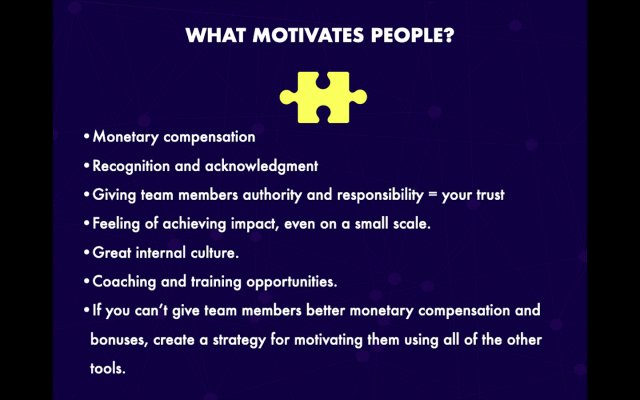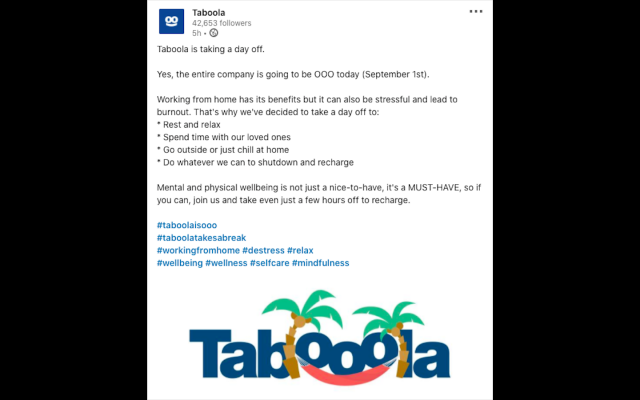Managing people is not easy, especially for those organizations that try to stretch their funding as much as possible. In this blogpost, I will be describing a few useful approaches to managing small teams that I have seen and used myself. In the startup context, teamwork is crucial to its success. Often, there is too much to do and the team is too small, yet these highly-motivated teams often achieve the (almost) impossible. Why are they so motivated and how can we design teamwork in any context to make them work better?
Small organizations, regardless of their type (technology startups, NGOs, traditional businesses, family companies etc.) have similar challenges. They are often underfunded and the staff is overworked. Team members need to be versatile: they tend to have many responsibilities and usually cover more than one type of position. The management does not only support others but split their time between their own work and supervising them. It is usually impossible to introduce HR-led team development programs and soft incentive plans due to lack of time and lack of funding (and sometimes the lack of an HR function altogether).
Startups face these and many other challenges. Yet, many of them achieve great results and their teams are very dedicated to their mission. Of course, startups create certain incentives that are sometimes impossible to emulate in other organizations, such as option plans and a promise of a big exit, or the opportunity to grow within the organization and take on new, diverse roles as it develops. Yet, I would argue that there are still many tools that any organization can learn from startup management style, which suit many types of organizations and do not require additional funding.
Israeli Startup Management Style
Coming to the Israeli startup ecosystem after many years in Europe made me discover a very different management style to what I had experienced before. Israelis are known for their directness and coarseness, no filter in delivering a message and ability to make personal connections easily.

A few ways to motivate teams.
In the context of managing small teams, these qualities are priceless. Direct communication is the cornerstone of building strong human relationships. Being a “real” person at work makes it possible for people to connect with each other and make friends. Generally, Israeli work environment mixes personal and professional life much more than anywhere I have lived. It is not always entirely positive, of course. Israelis tend to blend work and private life during working hours, being less productive and spending many hours at work in order to get the job done (many would argue that they work more than other nations; in my view it is related to a lower productivity per hour). However, it still has a positive influence on employees’ commitment to real people they like and connect to, because they know them well.
Related to this is the idea that workplaces with less hierarchy and more openness make it easier for employees to feel like the success of a company or a project is everyone’s priority. The lack of hierarchy brings people closer and makes them discuss issues and new ideas in a more receptive environment. Hierarchy makes it difficult for employees to feel like they really matter.
The concept of open, direct communication and building lasting relationships at work is definitely not new. It has always been a part of Israel’s DNA and it is also very popular in the Silicon Valley and other innovation hubs worldwide. Kim Scott’s “Radical Candor” takes it one step further, making it THE management style to achieve team greatness. Radical Candor method suggests that as a manager, you should care about your team members personally and challenge them directly. I’d say that the majority of Israeli founders try to emulate exactly that.
Ownership, Responsibility and Partnership
It goes without saying that trusting your employees empowers them to do the best job of their lives, making them both responsible for their work and in authority of it. It is also best achieved in small teams where it is still relatively easy to create and retain a consistent culture.
In small teams that work well, micromanagement and supervision give way to partnership and support. This leads individual contributors in the workplace to feel like they own their work, but can ask for help any time they need it. In addition, it makes managers less busy with supervision that may be unnecessary and more focused on mentoring their team members whenever they need actual support.
Because small organizations have flatter organizational structures, it is easier for the management to ensure that nobody is terrorizing their team or micromanaging specific individuals. It is also easier for the leadership to walk the talk and lead by example. As the organization grows, the culture of giving responsibility and offering partnership is more difficult to retain.
Remote Work in a Small Teams Context
Covid-19 has arguably changed small teamwork much more than large organizations, which were used to having big teams spread around the world, making video conferencing with colleagues a daily practice. These days, those teams that a year ago sat in a few adjacent rooms and ate their lunch together have started communicating exclusively via email and Zoom.
Still, thanks to the widespread culture of openness, many startup teams have worked to retain the intimate culture with their team mates by incorporating informal communication and socializing. For instance, adding channels devoted entirely to fun and humor are one way (e.g. to existing Slack or Whatsapp). Creating a unique emoji language is another – many remote-first startup companies use emojis to communicate beyond words, creating the whole internal language of the organization. (N.B. on Slack, you can actually customize your emoji language to create a truly unique team experience).
“Visual communication is important to our organization’s culture – I can’t imagine us being a truly remote-first organization without the help of emojis.”
Wiktor Schmidt, Executive Chairman at Netguru
Another way to create an atmosphere of informality is to create happy-hour like meetings, where people come together specifically to bond and connect. Some companies create the happy-hour Zoom calls every week towards the beginning of the weekend, making it a team routine. Others meet their employees every day for 9 o’clock coffee to start the day as if all of them were meeting in the office kitchen. Any activity that makes people be seen as human beings and not mere human resource contributes to their motivation and makes it nicer for everyone to show up for work – in real or virtual realm.

Source: Taboola Linkedin Account
Finally, a few words can be said about progress checks and support in the remote-first teams. It is again really easy to step into the trap of micromanaging teams by demanding constant work updates and it can be stressful for team members to deliver specific milestones every single time. Instead, I’d go for short “standing meetings” on a video platform of your choice, making it possible for people to share the day’s process, issues and frustrations or successes with everyone and not only completed tasks. In this way, managers have a way to check work flow without being intrusive, whereas individual contributors are able to focus on an individual’s process and progress, demonstrating dedication more accurately.
***
Obviously, salary has proved to be a great motivator for employees regardless of a sector. However, if you can’t give your employees a better monetary compensation, develop a strategy for motivating them by offering great internal culture.
Even without deep pockets, a small organization has many ways to motivate employees to achieve great work. Their contributions should always be recognized and acknowledged in a fair and clear way. Also, employees and teams should be given responsibility for and authority of their projects completely – this means their managers should take the leap of faith and trust them to do their job.
Once this is achieved, individual contributors feel that they are able to create impact, even on a small scale. Such feelings among team members build morale and contribute to great internal culture where nobody is put down, but everyone safely roots for their colleagues. Managers may then take up a role of mentors and facilitators.
Monika Rozalska-Lilo has co-created and until recently served as the CEO of CREATORS, an innovation lab based in Tel Aviv that supports organizations in developing and improving innovation practices. Monika’s expertise includes corporate innovation, startup ecosystems, ideation methodologies and building & facilitating innovation programs. Before CREATORS, Monika served as Deputy Director of TheHive by Gvahim, a startup accelerator program for international teams in Israel.
 RSS Feed
RSS Feed















 November 27th, 2020
November 27th, 2020  Awake Goy
Awake Goy  Posted in
Posted in  Tags:
Tags: 













